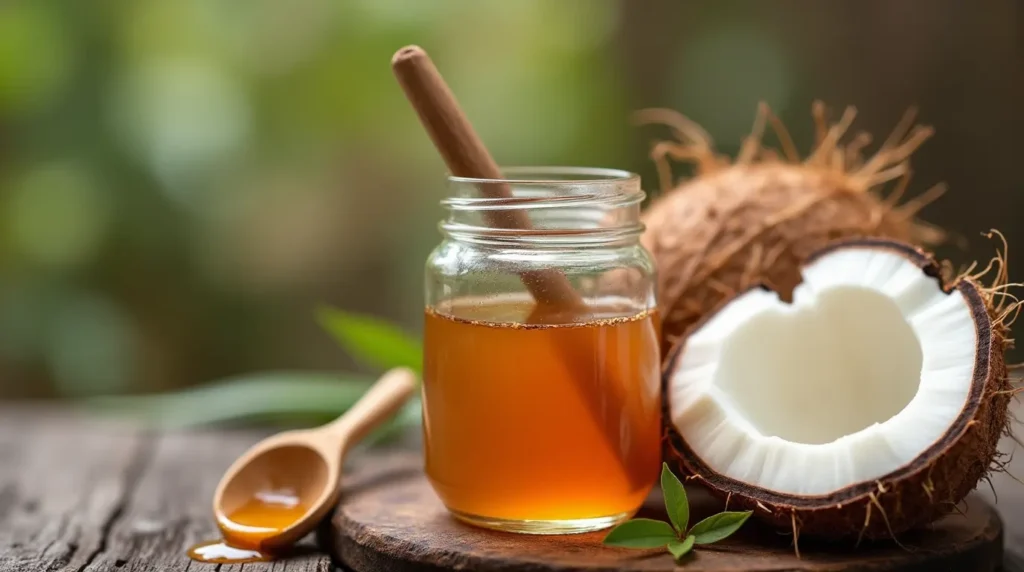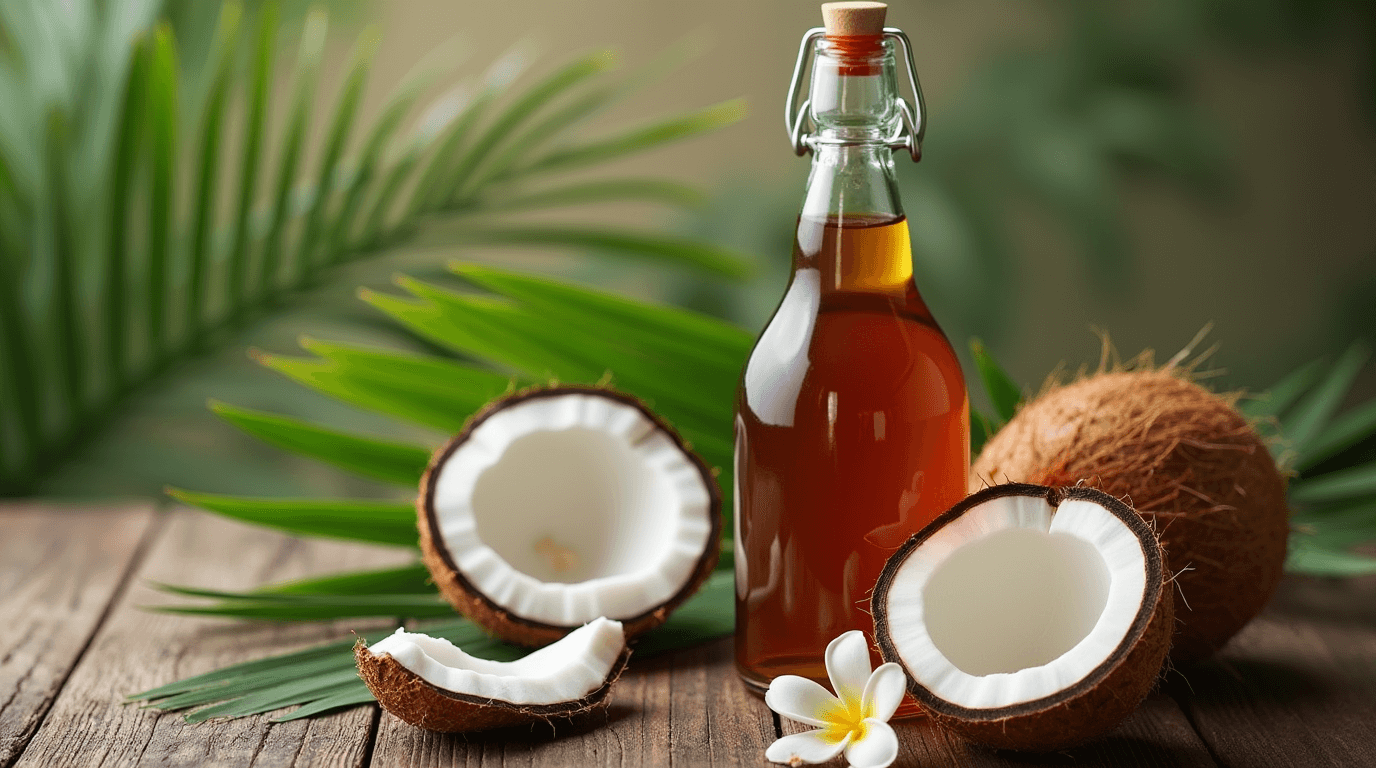Table of Contents
Coconut syrup is a versatile and delicious tropical sweetener that has been gaining popularity not just for its flavor but also for its potential health benefits. Derived from the sap of coconut blossoms or made with coconut milk and sweeteners, this syrup offers a natural alternative to refined sugars and artificial sweeteners. In this guide, we’ll explore everything you need to know about coconut syrup—from its production and varieties to its culinary uses, health advantages, and DIY recipes. Whether you’re a seasoned cook or just curious about this tropical delight, this article is your ultimate resource.
Introduction to Coconut Syrup
What is Coconut Syrup?
This sweet, golden liquid is extracted from the sap of coconut blossoms or created by blending coconut milk with sweeteners. Its rich, nutty flavor and tropical essence make it a versatile addition to numerous dishes. Unlike refined sugars, this syrup retains trace minerals and nutrients, making it a healthier alternative for sweetening food and drinks.
Widely used in pancakes, waffles, beverages, and desserts, this tropical delight holds a special place in Southeast Asian and Hawaiian cuisines. Beyond indulgence, it’s a small step toward healthier eating habits in everyday meals.
History and Origin
This natural sweetener originates from tropical regions like Southeast Asia and the Pacific Islands, where coconut trees flourish. Traditionally, locals tapped the sap of coconut blossoms to create sweeteners and beverages. Over time, this sap was boiled into the syrup we know today.
In Hawaii, for example, it became a favorite topping for pancakes, bringing a tropical flair to breakfast. As the world embraced natural alternatives to sugar, this syrup gained fame for its unique flavor and culinary versatility..
Nutritional Profile of Coconut Syrup
While coconut is undoubtedly sweet, it brings more to the table than just calories. This natural sweetener contains trace amounts of minerals like potassium, magnesium, and zinc. These nutrients, though present in small quantities, contribute to its appeal as a better alternative to processed sugars.
Compared to traditional sugar, coconut syrup boasts a lower glycemic index, which means it doesn’t spike blood sugar levels as rapidly. However, moderation is key—it’s still a source of sugar, so enjoy it responsibly.
Production and Varieties
How Coconut Syrup is Made
The process of making coconut syrup starts with nature’s own sweet elixir—coconut sap. Farmers and producers follow these steps to create this delicious sweetener:
Tapping the Blossoms: Farmers cut and tie the coconut flower buds carefully to collect the sap. This sap, often called toddy or tuba, flows slowly into containers.
Filtration: Producers filter the raw sap to remove impurities, ensuring a clean and pure base for the syrup.
Cooking the Sap: They gently heat the filtered sap in large pots or woks, simmering it to reduce water content and concentrate the sugars.
Thickening and Caramelization: The boiling sap thickens and develops a rich, caramel-like consistency. Producers monitor it closely to prevent overcooking, which can alter the flavor.
Cooling and Bottling: After reaching the desired consistency, they cool the syrup and pour it into sterilized bottles, preparing it for storage or sale.
This traditional process ensures that the syrup retains its natural minerals and unique tropical flavor, making it a prized ingredient in kitchens worldwide.
Types of Coconut Syrup
Coconut syrup is available in several forms, each tailored to unique culinary preferences and flavor profiles. Below are the primary varieties:
Pure Coconut Sap Syrup: Created entirely from coconut sap, this version is celebrated for its authentic taste and slightly smoky, caramelized sweetness.
Coconut Milk-Based Syrup: This creamy alternative blends coconut milk with sweeteners, delivering a rich texture that’s ideal for enhancing desserts or beverages.
Flavored Variations: Infused with flavors like pandan (often called cocopandan), vanilla, or citrus, these syrups bring a creative flair to both traditional and modern recipes.
Each type has its unique appeal, from the rich authenticity of pure sap syrup to the playful versatility of flavored options.
Commercial vs. Homemade Coconut Syrup
When it comes to coconut, you have two main options: store-bought or homemade. Let’s weigh the pros and cons:
- Commercial Coconut Syrup: Store-bought varieties are convenient and consistent in flavor. They’re often available in a range of types, including flavored and organic options. However, they may contain added preservatives, artificial flavors, or excess sugars. Checking the ingredient list is crucial to ensure quality.
- Homemade Coconut Syrup: Crafting syrup at home allows you full control over ingredients. You can choose organic sap, customize the sweetness, and experiment with flavors. Homemade versions are free of additives, making them a healthier choice. The only downside? It takes time and effort to perfect the process.
Ultimately, the choice between commercial and homemade depends on your priorities—whether it’s convenience or the joy of creating something fresh and pure in your own kitchen.
Culinary Uses of Coconut Syrup
Coconut Syrup in Traditional Dishes
Coconut syrup plays a key role in tropical cuisines. In Hawaii, it’s drizzled over fluffy pancakes for a nutty sweetness that enhances every bite. The Philippines uses it to sweeten latik, a topping for sticky rice desserts like biko and cassava cakes, adding a rich caramelized flavor.

Meanwhile, in Indonesia and Malaysia, cocopandan syrup, a flavored variant, brings life to desserts such as es campur (shaved ice) and kue putu (steamed rice cakes), highlighting the syrup’s versatility in both sweet and savory dishes.
Coconut Syrup in Beverages
Coconut adds a tropical twist to drinks. In coffee and tea, it imparts a smooth, nutty sweetness. Mocktails like coconut lime cooler blend coconut syrup with lime juice and soda water for a refreshing drink.
Milkshakes and smoothies also shine with its addition. A classic banana smoothie, sweetened with coconut syrup, gains depth and natural sweetness, making this syrup indispensable in beverage creations.
Baking and Desserts with Coconut Syrup
Coconut syrup shines in the world of baking, where it can replace traditional sweeteners to enhance the flavor and texture of various treats. In cakes, it brings a moistness that pairs beautifully with flavors like vanilla, chocolate, or citrus. Imagine a coconut pound cake drizzled with warm coconut syrup—simply irresistible!
Cookies and muffins also benefit from the syrup’s caramelized notes, which add complexity to every bite. A batch of coconut oatmeal cookies, sweetened with coconut syrup, is a wholesome twist on a classic favorite.
For no-bake desserts, such as energy balls or granola bars, coconut syrup acts as both a sweetener and a binder, ensuring the ingredients stick together while adding a subtle tropical flavor. Its versatility in desserts makes it a go-to choice for bakers looking to experiment with natural, flavorful ingredients.
Health Benefits and Considerations
Health Benefits of Coconut Syrup
Coconut syrup offers several potential health advantages, making it an appealing choice for those seeking a natural sweetener. One of its most notable benefits is its low glycemic index (GI). With a GI lower than refined sugar, it causes a slower and more gradual rise in blood sugar levels. This makes it a preferred sweetener for individuals looking to manage their energy levels or maintain steady blood sugar.
Additionally, coconut syrup contains small amounts of minerals like potassium, magnesium, and zinc. While these aren’t present in large quantities, they still contribute to the syrup’s appeal as a nutrient-rich alternative. Potassium, for example, supports heart health, while magnesium plays a role in muscle function and energy production.
Unlike artificial sweeteners, coconut syrup is free from harmful chemicals, offering a more natural way to sweeten foods and beverages. However, it’s important to remember that, like any sugar source, moderation is key to reaping its benefits without overindulging.
Dietary Considerations and Allergies
For those with specific dietary needs, coconut syrup is a versatile option. It’s naturally vegan, as it’s plant-derived, and it’s also gluten-free, making it suitable for people with celiac disease or gluten sensitivities.
However, individuals with coconut allergies should exercise caution. Though rare, coconut allergies can cause adverse reactions, so it’s important to verify ingredients in processed coconut syrups to avoid allergens or additives.
Another advantage is its compatibility with a wide range of diets, including paleo and Whole30, provided the syrup is minimally processed. Keto dieters, however, should use it sparingly due to its carbohydrate content. Always check labels on store-bought syrups to ensure they meet your dietary criteria.
Coconut Syrup vs. Other Sweeteners
When comparing this tropical sweetener to popular options like maple syrup, honey, and agave nectar, each stands out with unique qualities:
Maple Syrup: Both are natural and flavorful, but maple syrup carries a more robust caramel tone. While maple syrup excels in manganese content, the tropical option provides trace minerals such as potassium.
Honey: Sweeter and packed with antioxidants and antibacterial benefits, honey has its perks. However, it isn’t vegan, giving the coconut-based alternative a distinct advantage for plant-based diets.
Agave Nectar: Known for its low glycemic index, agave nectar lacks the added nutritional value found in this syrup. Additionally, agave nectar often undergoes heavy processing, unlike the minimally processed tropical option.
In terms of taste, coconut syrup’s tropical essence makes it a unique addition to dishes and beverages, providing a subtle flavor that doesn’t overpower other ingredients.
How to Make Coconut Syrup at Home
Simple Homemade Coconut Syrup Recipe
Making coconut syrup at home is a rewarding way to enjoy this delicious sweetener without additives. Here’s a straightforward recipe to get you started:
Ingredients:
- 1 cup coconut sugar (or regular sugar if unavailable)
- 1 cup coconut milk or water (for a thinner consistency)
- 1 tsp vanilla extract (optional, for flavor)
- A pinch of salt

Instructions:
- Combine Ingredients: In a medium saucepan, combine the coconut sugar and coconut milk (or water). Add a pinch of salt to enhance the flavor.
- Heat Mixture: Place the saucepan over medium heat and stir until the sugar dissolves completely.
- Simmer and Reduce: Lower the heat and let the mixture simmer gently for 15–20 minutes, stirring occasionally. As it cooks, the syrup will thicken and take on a glossy appearance.
- Add Flavor (Optional): If desired, stir in vanilla extract during the last few minutes of cooking for added aroma.
- Cool and Store: Remove the syrup from heat and let it cool to room temperature. Pour it into a sterilized glass jar or bottle for storage.
Homemade coconut can be used as a topping, in recipes, or as a sweetener for beverages.
Variations of Homemade Syrup
Creating customized versions of this sweetener allows you to adapt it to your preferences and dietary requirements. Here are a few creative options to try:
Paleo-Friendly Option: Replace refined sugar with coconut sugar and use coconut water instead of milk. This approach yields a lighter syrup suitable for paleo diets.
Keto-Friendly Variation: Swap out coconut sugar for erythritol or another low-carb sweetener. To achieve the desired thickness, use xanthan gum as a substitute for extended simmering.
Flavored Syrups:
- Citrus Syrup: Add lemon or orange zest during cooking to brighten the flavor. It works wonderfully as a topping for pancakes or crepes.
- Vanilla Syrup: Stir in a teaspoon of pure vanilla bean paste for a creamy and aromatic twist.
- Pandan Syrup: Simmer the syrup with pandan leaves to infuse a fragrant, green-tinted essence, perfect for Southeast Asian desserts.
These options make it easy to experiment with flavors and meet dietary needs while enjoying the natural sweetness of coconut-based syrup.
Storage and Shelf Life of Homemade Coconut Syrup
Proper storage is essential to maintain the freshness of your coconut. Here’s how to do it:
- Store in a Sterilized Container: Use an airtight glass jar or bottle that has been thoroughly cleaned and sterilized.
- Refrigeration: Always store homemade coconut syrup in the refrigerator to prevent spoilage. The cold temperature keeps it fresh and extends its shelf life.
- Shelf Life: Homemade coconut typically lasts up to 2–3 weeks when refrigerated. For longer storage, consider freezing portions in an ice cube tray for easy use.
To check for freshness, look for changes in smell, texture, or color, which may indicate spoilage. Homemade syrup is best enjoyed fresh, so make small batches to ensure quality.
Frequently Asked Questions
Is Coconut Syrup the Same as Coconut Sugar?
No, these two sweeteners are distinct. Coconut sugar is a granulated product created from dehydrated sap, while the syrup is a liquid version of the same sap, cooked down to achieve a thick, rich texture. Coconut sugar is best used as a dry sweetener, whereas the syrup shines when drizzled over dishes, blended into drinks, or added to sauces.
Can Coconut Syrup Be Used as a Sugar Substitute in Baking?
Yes, but consider its differences:
- Texture: Adds moisture, so reduce other liquids.
- Sweetness: Slightly less sweet than refined sugar.
- Flavor: Its nutty, caramel notes suit chocolate and tropical recipes.
It’s perfect for cookies, cakes, and muffins, offering sweetness and depth.
Is This Sweetener Suitable for Diabetics?
Thanks to its lower glycemic index, this tropical option raises blood sugar more gradually than refined sugars. However, individuals with diabetes should use it sparingly and consult their healthcare provider before incorporating it into their diet.
How Does It Compare to Maple Syrup?
This syrup delivers a tropical, nutty, and slightly smoky flavor with caramel undertones, while maple syrup offers a lighter, woody sweetness. The boldness of the tropical syrup complements unique recipes, whereas maple syrup is more versatile for general use.
Where Can You Buy It?
Look for it at health food stores, organic sections, or online retailers like Amazon. Popular options include brands such as Big Tree Farms and Maui Coconut Syrup.
Can It Sweeten Coffee?
Absolutely! Its smooth, caramel-like sweetness enhances the flavor of coffee without overpowering it. Try it in lattes, black coffee, or iced drinks for a tropical twist.
How Does It Differ from Cream of Coconut?
While this syrup is a liquid sweetener made from coconut sap, cream of coconut is thicker, made from coconut milk, and commonly used in desserts.
Is It Vegan?
Yes, this plant-based sweetener is perfect for a vegan diet.
How Should It Be Stored?
Keep it in an airtight container in a cool, dry place. For homemade versions, refrigeration extends freshness for up to 2–3 weeks.
Can You Make Flavored Versions at Home?
Certainly! Infuse it with vanilla, pandan, or citrus during cooking for creative variations.
What Are Some Top Brands?
Leading options include Big Tree Farms, Hawaiian Sun, and Maui Coconut Syrup, available in both pure and flavored varieties.
Is It Gluten-Free?
Yes, this sweetener is naturally free of gluten, making it safe for those with sensitivities.
Can It Work in Savory Dishes?
Absolutely! Its sweetness enhances marinades, dressings, and even roasted vegetables, adding depth to savory meals.
How Does Cocopandan Syrup Differ?
Cocopandan syrup includes pandan flavor, delivering a floral aroma and a green tint, while the original version maintains its natural caramel hue.
Does It Contain Preservatives?
Commercial options may include preservatives, so always check the labels. Homemade varieties are free of additives but have a shorter shelf life.

